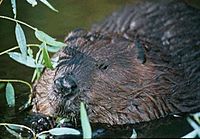Castoridae facts for kids
Castoridae is a group of rodents. Think of it like a big family tree for animals! Today, the only living members of this family are the modern-day beavers, found in the genus Castor. But long, long ago, there were about 20 other types of beavers that are now extinct.
Quick facts for kids CastoridaeTemporal range: Late Eocene - Recent
|
|
|---|---|
 |
|
| American Beaver, Castor canadensis | |
| Scientific classification | |
| Kingdom: | |
| Phylum: | |
| Class: | |
| Order: | |
| Suborder: | |
| Family: |
Castoridae
Hemprich, 1820
|
| Genera | |
|
Castor (modern-day Beavers) |
|
Contents
What are Castoridae?
The Castoridae family includes all beavers, both the ones alive today and their ancient relatives. These animals are known for their strong teeth and their ability to live in and around water. They are part of the larger group of mammals called rodents.
Modern Beavers: The Castor Genus
Today, there are two main types of beavers still living. These are the North American beaver (Castor canadensis) and the Eurasian beaver (Castor fiber). Both of these species belong to the Castor genus. They are famous for building amazing dams and lodges in rivers and streams.
Beaver Homes and Habits
Beavers are incredible engineers of the animal world. They use their strong teeth to cut down trees and branches. They then use these materials to build dams across waterways. These dams create calm, deep ponds where beavers can build their homes, called lodges. A lodge is like a cozy island fortress, with underwater entrances to keep predators out. Beavers are mostly active at night. They spend their time gathering food and maintaining their homes.
Ancient Beavers: Extinct Relatives
While modern beavers are the only ones left, the Castoridae family used to be much larger. Scientists have found fossils of many different kinds of ancient beavers. These extinct beavers lived millions of years ago. Some of them were quite different from the beavers we see today.
Giant Beavers of the Past
One of the most famous extinct beavers was Castoroides, also known as the giant beaver. This amazing animal was much bigger than modern beavers. It could grow to be over 2 meters (6.5 feet) long and weigh up to 100 kilograms (220 pounds). That's about the size of a black bear! Unlike modern beavers, the giant beaver probably didn't build dams. Scientists believe it lived in swamps and wetlands.
Images for kids
See also
 In Spanish: Castóridos para niños
In Spanish: Castóridos para niños
 | Claudette Colvin |
 | Myrlie Evers-Williams |
 | Alberta Odell Jones |





